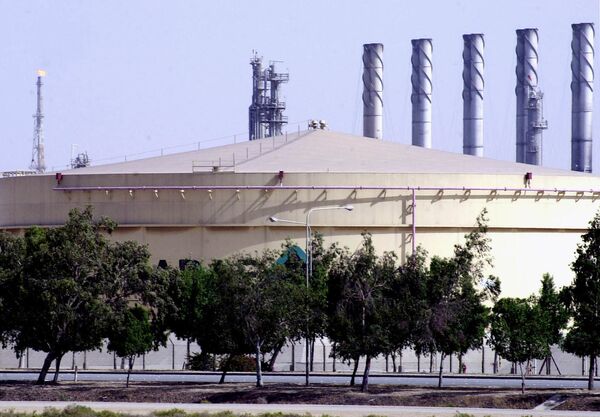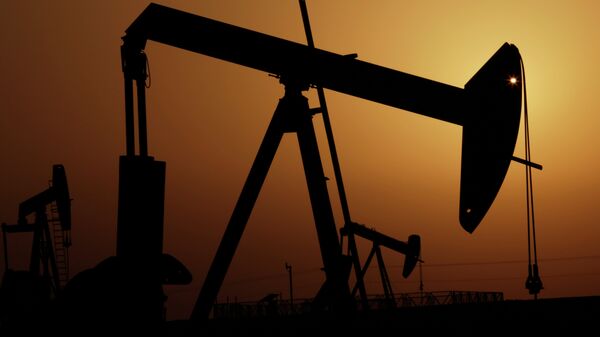US Secretary of State Mike Pompeo directly implicated Iran before presenting any proof to back his claim while insisting that there was "no evidence the attacks came from Yemen".
Tehran is behind nearly 100 attacks on Saudi Arabia while Rouhani and Zarif pretend to engage in diplomacy. Amid all the calls for de-escalation, Iran has now launched an unprecedented attack on the world’s energy supply. There is no evidence the attacks came from Yemen.
— Secretary Pompeo (@SecPompeo) 14 сентября 2019 г.
According to CNN's 17 September report, American and Saudi investigators determined "with very high probability", that strike was launched from an Iranian base located on the border with Iraq. Riyadh even presented some debris as evidence of Iranian participation in the strike.
Iranian Foreign Minister Javad Zarif rubbished the US and Saudi accusations suggesting that "having failed at 'max pressure', Secretary Pompeo is turning to 'max deceit'".
"US is in denial if it thinks that Yemeni victims of 4.5 years of the worst war crimes wouldn't do all to strike back", Zarif tweeted on 17 September. "Perhaps it's embarrassed that $100s of billions of its arms didn't intercept Yemeni fire".
Under the pretext of the Saturday drone attack Donald Trump ordered the Treasury Department to "substantially increase" sanctions on Iran.
The strikes have also prompted American allies to enrol in the US-led International Maritime Security Construct more enthusiastically. The maritime initiative was kicked off in early August in the aftermath of repeated attacks on oil tankers in the Gulf of Oman.
Defenceless Aramco
On 18 September, Saudi coalition spokesman Col. Turki al-Maliki suggested that almost 25 drones and cruise missiles were used in the attack against the kingdom's oil giant and criticised Iran for what he called its "destabilising role" in the region.
Since the Saudi regime has blamed Iran—baseless as that is—for the attacks on its oil facilities, curious that they retaliated against Hodaideh in Yemen today—breaking a UN ceasefire. It is clear that even the Saudis themselves don't believe the fiction of Iranian involvement.
— Javad Zarif (@JZarif) 21 сентября 2019 г.
"The fact that the United States has not produced the intel on this tells me that the strike came from Yemen, not Iran," notes Larry C. Johnson, a former US Central Intelligence Agency's (CIA) analyst.
Moreover, the assumption that drones or cruise missiles flew all the way from Iran to Saudi Arabia being undetected by the American Navy’s Fifth Fleet which is headquartered in Bahrain would amount to the admission of the US military's ineffectiveness.
"Pompeo is totally out of his mind when he puts the blame on Iran for the attack", says Christopher Assad, a Canada-based political analyst of Syrian descent. "Indirectly he admits that Iran is capable of striking anywhere in the Middle East without getting detected".
According to the political analyst, it was definitely the attack by Houthis aimed at demonstrating their capability of inflicting "some real heavy losses on all the players in the Saudi coalition attacking Yemen, with worldwide consequences".
Assad refers to the 18 September statement by Yemeni Armed Forces spokesman Brigadier General Yahya Saree, who said that the country's military "ha[s] reached a high level of efficiency and ability." Saree specified that the Yemenis used the third generation of domestically made combat drones in the recent attack codenamed the Second Deterrent Balance Operation.
Philip Giraldi, a former CIA counter-terrorism specialist and military intelligence officer, presumes that Iran could play a part in the strikes "through its proxies in Yemen or Iraq."
"[The attack] sought to demonstrate that Saudi Arabia, Israel and the US bases in the region are extremely vulnerable to counter-attack. It showed that to be the case", he underscores.
While investigations into the Aramco strike are going on, one thing is clear: the US-made Patriot surface-to-air missile systems failed to intercept the drones.
"What does the American defense umbrella mean under this situation?" rhetorically asks James Dorsey, an award-winning journalist and senior fellow at the S. Rajaratnam School of International Studies at Singapore's Nanyang Technological University.
According to National Interest's David Axe, Riyadh has spent billions of dollars over the recent years installing up to six battalions of MIM-104 Patriot and associated radars. The journalist noted in his op-ed that it had not been the first time that Patriots had failed, suggesting that the Russian-made S-400 air defence system or even smaller Pantsir-S1 would have repelled the drone strike more effectively.
However, Christopher Assad envisages that the Saudis will now try to resolve their vulnerability problem "via more purchases of advance military hardware" which will definitely play into the hands of the US military industrial complex.
Meanwhile, on 20 September, the Pentagon announced that it would deploy additional US troops and missile defence weapons to Saudi Arabia and the United Arab Emirates (UAE).

The Timing of the Strike
In the immediate aftermath of the attack oil prices soared by 15 percent but then fell again. According to Dorsey, there are two main factors which will influence prices: "Once you know about damages then you know will it take a couple of weeks or a couple of months", he notes. "The other thing is that it highlighted the vulnerability of oil assets in Saudi Arabia," added Dorsey. "You could get political risks which were not factored in to the oil price until now".
Earlier last week Saudi Arabia signalled that it would restore its lost production by the end of September and would regain its output capacity of 12 million barrels a day by the end of November 2019.
The timing of the strike deserves special attention: it came while Riyadh was preparing its oil giant Aramco for a long-awaited initial public offering (IPO) involving global banking giants, such as J.P. Morgan, Goldman Sachs, Credit Suisse and Citigroup.
"I think the timing is important in that it came just before the IPO, meaning it was intended to inflict maximum economic damage on Saudi Arabia, and also just before the election in Israel," said Philip Giraldi, who sees the strike as a message to more than one player in the region.
The former CIA field officer notes that at the same time, US investors could capitalise on the situation getting shares of Aramco "at much lower prices than would have been the case previously."
Foreign bankers appear set to move ahead with the planned IPO, despite the fact that the recent strike exposed the vulnerability of Saudi oil infrastructure.
According to Bloomberg, Bank of America, Citigroup, Credit Suisse Group, Goldman Sachs Group, JPMOrgan Chase, and Morgan Stanley are preparing for the event while Barclays, BNP Paribas SA, Deutsche Bank AG, and UBS Group AG have also jumped on Aramco IPO's bandwagon as bookrunners.
However, it appears that the Saudis do not want to lose money: on 24 September, Reuters reported that Riyadh is unlikely to list its state-owned oil giant Aramco this year, citing sources familiar with the issue.
Aramco's IPO was intended to become a crucial part of Saudi Crown Prince Mohammed bin Salman's Vision 2030, an economic strategy to reduce the kingdom's dependence on crude.
'US Neocons Have No Idea of the Toxic Pandora’s Box They are Playing With'
Former CIA analyst Larry C. Johnson does not attach "any particular importance" to the timing of the strikes, citing the fact that Houthi attacks on Saudi facilities is nothing new amid the four and a half-year long conflict.
"That said, Pompeo’s remarks are a reminder that there remains a strong neo-con element in the Trump Administration that are keen on going to war with Iran," he said.
Johnson does not believe that this attack really benefits anyone given the risks of a wider conflict: "If the Saudis or the US decide to hit Iranian targets it is almost certain that Iran will retaliate and has the ability to destroy a significant portion of Saudi Arabia's oil and water infrastructure," the former CIA analyst says. "An action like that would likely spiral out of control and set the stage for a war that would embroil major powers."
Although Trump "is trying to keep the lid on this despite some of his bombastic comments," there many others in Washington DC who are "pushing for a military solution" of the Iranian issue, Johnson notes, adding that "they have no idea of the toxic Pandora’s box they are playing with."
Meanwhile, on 23 September, France, Germany and the UK followed Washington's suit by saying that Iran bears responsibility for the Aramco attack.
"It is clear for us that Iran bears responsibility for this attack. There is no other explanation," the joint statement by Paris, Berlin and London noted, despite presenting no proof to back its claim.
Iran resolutely rejected the accusations and came up with a new peace initiative aimed at ensuring security in the Persian Gulf. On 22 September, Iranian President Hassan Rouhani called upon regional powers to team up in order to maintain peace and order in the region and warned against foreign influence.
Later, Iranian Foreign Minister Mohammad Javad Zarif clarified that the potential regional coalition could include Iran, Iraq, Saudi Arabia, Bahrain, the United Arab Emirates, Qatar, Oman, Kuwait and possibly Yemen. The proposed plan seems to be Tehran's response to the US-led maritime patrols in the region which were joined by Saudi Arabia and the UAE following the drone strikes.
Addressing the General Assembly on Tuesday United Nations Secretary General Antonio Guterres warned against potential escalation in the Persian Gulf.
"In a context where a minor miscalculation can lead to a major confrontation, we must do everything possible to push for reason and restraint," he stressed.




